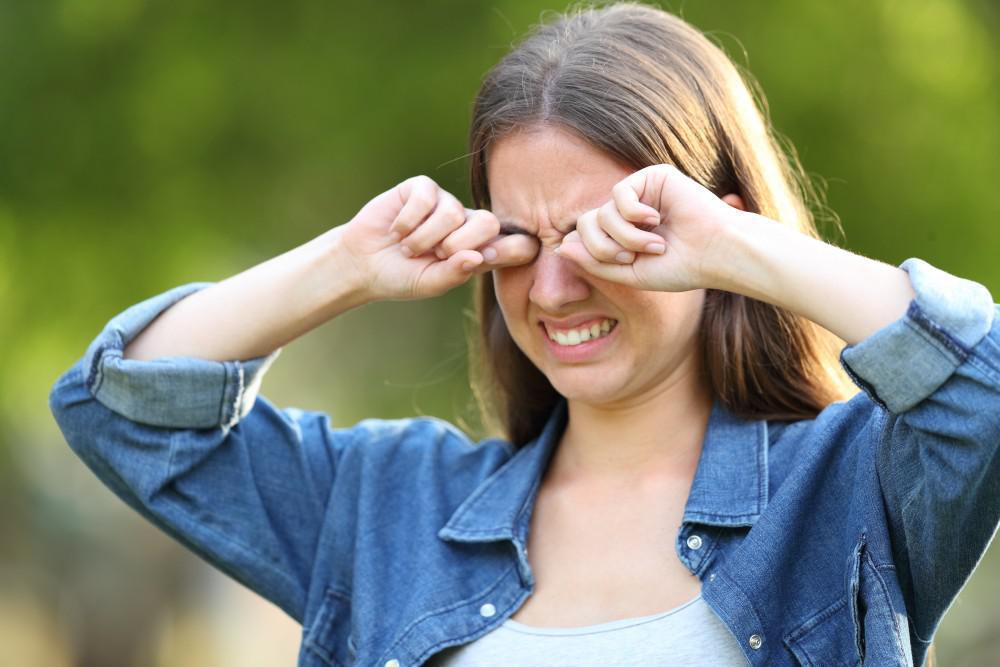How dry is too dry?
We all endure an occasional bout of dry eyes on a hot summer day. However, when dry eyes occur on a regular basis, outside of such situations as flying in a dry airplane cabin or walking on a windy day, it’s time for a professional eye exam.
Common symptoms of dry eyes
Symptoms of dry eyes include:
1. Redness
Dryness expands blood vessels within your eyes, making them appear more bloodshot.
2. Light sensitivity
Sensitivity to light may increase with dryness.
3. Blurred vision
Dry eyes can affect your overall eyesight, increasing blurriness and/or night blindness.
4. Fatigue
If you feel more eye fatigue than usual, this could be due to dry eyes.
5. Itching
As tempting as it may be to scratch your eyes when they feel especially dry and itchy, it’s better to use artificial tears to avoid additional harm.
Our optometrists address these and other issues, such as difficulty wearing traditional contact lenses or watery eyes due to tear duct blockages, by examining your eyes for dry eye disease. Untreated, this condition can lead to more serious problems from vision damage to corneal abrasions.
Why so dry?
Dry eyes arise for a variety of reasons, ranging from aging to autoimmune diseases, such as Sjogren’s syndrome, rheumatoid arthritis and lupus. Chronic dry eyes from allergies, medications, dehydration and computer use can often be corrected through certain modifications, including:
- Blink more frequently while working on the computer
- Alter your medications, if possible
- Use antihistamine eye drops instead of oral antihistamines, which may worsen dry eyes
Other simple fixes, from drinking more water to ease dehydration, adding fish oil or omega-3 rich foods, such as fatty fish or flax seeds, to your diet, or moistening indoor air with a humidifier, may also help. We can also switch your standard contact lenses to glasses or special contacts created to reduce dry eyes.
Medical options to treat dry eyes
We also provide a range of medical methods to relieve dry eyes, including:
Artificial tears or ointments
These keep your eyes in tip-top shape, even while you sleep.
Lipiflow device
Your eyelids contain glands that put oil into your tears. Lipiflow employs heat and pressure to unclog blocked eyelid glands, easing dryness.
Punctal occlusion
Applying heat to block tear ducts regulates tear flow from your eyes to your nose, retaining additional moisture within your eyes.
Non-dissolving punctal plugs
We may also prescribe temporary, removable plugs to block tears from exiting your eyes.
If your condition is due to a lack of testosterone within your eyelid’s oil glands, applying testosterone cream to your eyelids may help your oil glands perform better.
Avoid further complications
Left untreated, dry eyes can lead to more serious conditions, such as inflammatory conjunctivitis, which causes discomfort, redness or light sensitivity, and corneal ulcers, open sores on your cornea that grow more inflamed by dryness.
If your eyes don’t produce enough tears, look no further than our knowledgeable team at Classic Vision Care for help. Call us or book an appointment online today.
You Might Also Enjoy…
Is Squinting Bad for Your Eyes?If you find yourself squinting throughout the day in order to see better, it may be a sign you need glasses. Is continuous squinting bad for your eyes? See how you can correct your vision without squinting.
Are Glasses Better than Contacts?Trying to decide between wearing eyeglasses or contact lenses? Consider all the factors, including comfort, ease, and appearance. We’ve compiled a list of pros and cons to help you see your way through this significant decision.
Why Sunglasses are Important All Year LongNo doubt you always have your favorite shades close by all summer. But sunglasses protect your eyes all year long, even during darker winter months. Learn how they shield your eyes from harmful ultraviolet (UV) rays any time of year.
How Astigmatism Affects Your VisionAstigmatism causes a variety of symptoms ranging from blurred vision to eye discomfort and pressure. Understand how a comprehensive eye exam can pinpoint the cause of your symptoms and get your sight back on track.
Who Is at Risk for Glaucoma?Could you be at risk for glaucoma? The short answer is that everyone, especially seniors, is at risk for glaucoma. Learn how to lessen your odds of losing your sight through early detection and treatment.
5 Steps to Prevent Diabetic Eye Disease People with diabetes are more vulnerable to certain eye diseases, such as glaucoma, cataracts, and diabetic retinopathy. Learn what steps you can take to slow their progression and potentially avoid them in the first place.







